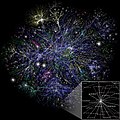Inferential Theory of Learning (ITL) is an area of machine learning which describes inferential processes performed by learning agents. ITL has been continuously...
4 KB (408 words) - 17:38, 26 June 2025
Inference (logic) Inferential mood (grammar) Inferential programming Inferential role semantics Inferential theory of learning Informal inferential reasoning...
355 bytes (69 words) - 13:06, 10 January 2019
Statistical inference (redirect from Inferential statistics)
process of using data analysis to infer properties of an underlying probability distribution. Inferential statistical analysis infers properties of a population...
47 KB (5,519 words) - 22:27, 10 May 2025
of the University of Arizona's Steward Observatory In the Labyrinth, a role-playing system built on The Fantasy Trip Inferential theory of learning Information...
1 KB (180 words) - 18:51, 13 January 2023
Explanation-based learning Feature GloVe Hyperparameter Inferential theory of learning Learning automata Learning classifier system Learning rule Learning with errors...
39 KB (3,386 words) - 19:51, 2 June 2025
example of inferential programming. Logic programming Prolog Constraint programming Artificial intelligence Genetic programming Machine learning Artificial...
2 KB (165 words) - 16:39, 31 October 2024
Epistemology (redirect from Theory of Knowledge)
branch of philosophy that examines the nature, origin, and limits of knowledge. Also called "the theory of knowledge", it explores different types of knowledge...
208 KB (20,062 words) - 05:48, 22 June 2025
Statistics (redirect from Applications of statistics)
statistics. Two elementary summaries of data, singularly called a statistic, are the mean and dispersion. Whereas inferential statistics interprets data from...
78 KB (8,835 words) - 00:51, 23 June 2025
philosophy, theory of mind (often abbreviated to ToM) refers to the capacity to understand other individuals by ascribing mental states to them. A theory of mind...
136 KB (17,082 words) - 16:28, 29 May 2025
the construction of hypotheses and theories through the collecting and analysis of data. Grounded theory involves the application of inductive reasoning...
58 KB (7,609 words) - 19:36, 18 May 2025
engage in many of the behaviors that we consider to be uniquely human, such as abstract thought and the use of language. It is an inferential system that...
17 KB (2,185 words) - 01:03, 3 February 2024
Network science (category Network theory)
physics, data mining and information visualization from computer science, inferential modeling from statistics, and social structure from sociology. The United...
69 KB (9,905 words) - 10:05, 24 June 2025
Irrealis mood (section Inferential)
to denote it. In Latin, it is interchangeable with the jussive. The inferential mood (abbreviated INFER or INFR) is used to report a nonwitnessed event...
31 KB (2,778 words) - 02:13, 10 June 2025
Dog intelligence (redirect from Dog learning)
to follow human pointing gestures, nor was it associated with their inferential and physical reasoning abilities. A 2018 study on canine cognitive abilities...
46 KB (5,388 words) - 16:24, 23 June 2025
Advanced process control (category Control theory)
accuracy of the inference can be periodically cross-checked with laboratory analysis. Inferential measurements can be utilized in place of actual online...
9 KB (1,210 words) - 04:12, 25 June 2025
The history of learning to read dates back to the invention of writing during the 4th millennium BC. Concerning the English language in the United States...
51 KB (5,195 words) - 10:05, 8 April 2025
Ryszard S. Michalski (category Recipients of the Order of Merit of the Republic of Poland)
(1991) Hypothesis-driven constructive induction (1991) Inferential theory of learning (1991) Learning trees from rules (1993) Natural induction (1996) Learnable...
8 KB (714 words) - 06:31, 15 September 2024
function of argumentation, as opposed to the inferential function of theoretical arguments. Whereas theoretical arguments make inferences based on a set of principles...
48 KB (7,363 words) - 13:15, 24 May 2025
Pfannkuch, M., Regan, M. and Horton, N. J. (2010) Inferential reasoning: learning to "make a call" in theory. In Proc. 8th Int. Conf. Teaching Statistics (ed...
8 KB (1,080 words) - 18:55, 30 March 2024
Holism (redirect from The whole is more than the sum of its parts)
the structure of an expression's parts. Meaning holism suggests that the meaning of words plays an inferential role in the meaning of other words: "pet...
24 KB (2,934 words) - 21:47, 29 April 2025
Autodidacticism (redirect from Self-directed learning)
or self-education (also self-learning, self-study and self-teaching) is the practice of education without the guidance of teachers. Autodidacts are self-taught...
36 KB (3,780 words) - 22:54, 23 June 2025
distinct logical systems use different rules of inference. Propositional logic examines the inferential patterns of simple and compound propositions. First-order...
66 KB (7,327 words) - 08:42, 9 June 2025
consist of the other grammatical markers for evidence such as quotatives and inferentials. All languages have some means of specifying the source of information...
37 KB (4,013 words) - 07:31, 2 June 2025
Methodology (section As study of methods)
proceed by taking inferential steps, one at a time, until the solution to the initial problem is found. An important advantage of the synthetic method...
96 KB (10,865 words) - 17:29, 23 June 2025
educational theory proven to improve the learning of people within a social learning space. The standard of judgment for theory validity is evidence of workplace...
28 KB (3,483 words) - 02:58, 7 April 2025
evolved programs have a rich inferential structure not captured by the idea of a "content bias". They also argue that some of the phenomena DIT models attribute...
68 KB (8,251 words) - 18:27, 24 May 2025
Neo-Piagetian theories of cognitive development criticize and build upon Jean Piaget's theory of cognitive development. The neo-Piagetian theories aim to correct...
75 KB (9,896 words) - 02:13, 27 June 2025
Intuitive statistics (redirect from Applications of intuitive statistics)
to number, relative frequency, risk, and any systematic signatures in inferential capacity that an organism (e.g., humans, or non-human primates) might...
61 KB (7,109 words) - 14:58, 15 February 2025
Testing effect (redirect from Test-Enhanced Learning)
better than recall, inferential thinking has been supported and the transfer of learning is at its strongest with application of theory to practice, inference...
65 KB (6,883 words) - 15:12, 22 May 2025
biases). Error management theory asserts that evolved mindreading mechanisms will be biased to produce more of one type of inferential error than another. These...
21 KB (2,846 words) - 04:14, 6 January 2025








